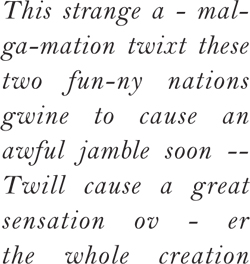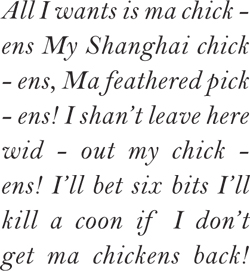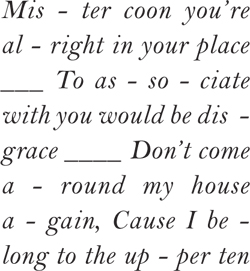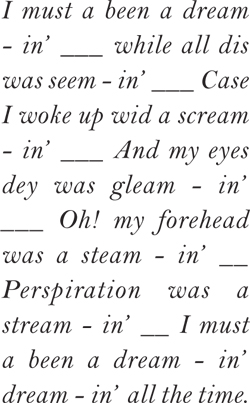Counternarratives (34 page)
Authors: John Keene


Open your mouth as if you intend to swallow. You set the glass down and
head for the door. “Excuse me, Sir, but you finished?” the young man, so light only
his features, hair texture reveal his story, murmurs politely, “Can I get you
anything else, Sir, send something up to your room?” You pause, look him over, see
the eyes catching yours, another time, you think, shake him off, force a half-smile
when you catch his flash of recognition, or perhaps it's just that broader sense of
a link mixed with abstract solidarity, so common wherever you see each other, our
people, even if no one else fully sees you, until the stain of disdain seeps in,
perhaps the young man stood at the doorway as you regaled everyone last night with a
few of the songs your fingers played from memory since your mind would not
cooperate, you could see your mother beaming from her seat as you completed “Under
the Bamboo Tree,” nodding, clapping, her eyes telling you that everything was all
right although it wasn't, it isn't, perhaps years before he saw you staring back
from a handbill, contentedly, unlike now, and he too secretly blames you, they all
do, for how you all are viewed? You pass into the alcove, past the check-in desk.
The doorman, dark as a pneumatic tire, in elaborate livery despite the heat, swings
the door open. You flinch, seeing your own face staring back, your mug never so cool
or placid anymore except in photographs, engravings, the same wide forehead, broad
slender lips, lantern eyes bearing something outward while beaming back in, making
you glad no mirror's nearby, that you never saw yourself on stage, made up and
masked, always masked, that awful jamble thankfully never captured for the
Nickelodeon or a gramophone, you recover and extract the sole billâ$10âyou have and
some coins from amid the goldweight and the paperweight you stuffed this morning in
each of your trouser pockets and place the money in that other palm, sheathed in
white cotton beneath which you know lies a square of pink ridged with brown like
your own, as your grip tenses, relaxes. The hurdy gurdy in your head churns on.
“Thank you so much, Sir. Shall I call you a driver, Sir?” the doorman asks, assuming
correctly that you will not want to walk in this heat through the streets toward
downtown, or perhaps you might be heading to Athens or across the river to Hudson.
No thank you, you mean to say, if you there, staves and quarter notes stalling your
tongue, spilling out, you think you assure the doorman you're fine with a wave and
head in the opposite direction, away from the town and river, northwest instead,
over the meadow toward Main.

The first response is to struggle but you should stifle it. On the
lawn as you pass a seated trio is laughing. Beneath them spreads a lake of gingham.
You know the couple, initially because of your stays here, later after time spent
with them in the City and at their home, Luther and Anna, they travel down from
Buffalo where he has a general practice and also runs the local colored paper and
she teaches school. You chatted with them briefly yesterday when you got in. The
other woman, pretty enough to be a movie star if colored women starred in movies,
looks familiar but you cannot place her. Gwendolyn, they introduce her, from Boston,
she was here last year with her parents, the father a bishop of some sort, now you
remember, I'll bet six bits she was one of Anna's former students you'd said to
yourself before you met her then, they are trying to make
that kind
of
introduction again, she straightens the ribbons in her loose black locks before you
take her hand and drop it. She is saying something to you about your songs, your
shows as you think you hear Luther ask, Why don't you join us, Bob? he and Anna
nodding, she adds, We'd like that, we haven't hardly seen you since you arrived. You
cannot hear what Gwendolyn is saying, it's as if someone has a trombone against your
lobes, playing an ostinato, the same long, low phrase, then the original song comes
back and you feel light, almost giddy, whisper you are going to walk over to the
creek, if you see yourself going along so, Luther looks at Anna, they lift
themselves up to join you. You touch your hairline where the music threatens to
erupt, as they gather up the knives and forks, the bread and honey, the corked
bottle of lemonade, place it in the basket, fold up the cloth, Luther's and Anna's
manners each as precise as they always have been, as anyone would expect of folks of
their station. Gwendolyn hangs back, fanning herself, her eyes trained on you. You
mean to say something about the weather, but no words emerge, nothing about the
food, the staff, your mother, Luther's suit, Anna's dress the shade of
crème
anglaise
, Boston, Harlem, Rosamond or Jimmy, the Sambo Girls Company or
your other efforts, touring, business in general, Gwendolyn in whom you'd never be
interested, your other
friends
in New York you would never discuss let
alone hint at, the train ride up, the last few months, years, the long winters of
blue periods that have plagued you even before the music could not be turned off.
Only a sound that sounds like the inside of a sound, a not-whistle, a not-warble,
not-words, a code, a cloud of could and cannot, and Luther laces his arm in yours,
Anna close by on his other side, the basket on her free arm, Gwendolyn somewhere
behind them, humming, why is she humming? two live as one, she's humming one of your
tunes, or is that you and the sound is escaping you, as it sometimes does, if you
like a me and I like a you, as you proceed across the grass to the road.

There is no way to counter the initial pain, a burning sensation,
but eventually it will subside. Luther's arm slows you, stops you here at the
roadside, you pause to pat your cheeks dry, your chest, the late afternoon heat is
intensifying, you all pause as cars and carriages barrel by. Anna is talking again,
something about her people who came up from Richmond to visit, some other folks they
met during a trip to Ottawa, the ones appearing every day in Buffalo from Kentucky
to Kingston, their planned cruise to Venezuela, what do you think about all the
lynchings so far this year, what do you think about the new National Association for
the Advancement of Colored People in New York, those white liberals and our folk who
belong to the upper ten, Rosamond and Jimmy know people involved with it, you do
too, what do you think, Luther's agreeing with everything she says, his voice like
hers softening as if to distract you, and though you cannot hear anything they're
saying clearly anymore, hear anything beyond this interior echo, though you perceive
somewhere in their tone something else in the rhythms of their words, the blade of
rebuke, not even friendship can hide it, you know what you did, they want to say,
what you wrote, how you helped to sow this sickness even in the minds of your own,
you know you did and tighten your fingers on the weights, so solid the gold, so
smooth the glass, sometimes you're up, sometimes you're down but they are anchoring
you right here, what do you think, as you squeeze on the weights what do you think
and you do not. Gwendolyn, whose voice tinkles like a triangle slightly out of tune,
has taken your elbow in her hand, fanning you as she inspects your eyes, your
trembling lips. She asks if you would like a drink of water. Luther pats you on the
back and suggests you all continue to the creek, sit on its banks briefly and rest,
then return to the hotel. You want to say you were heading there anyways, the shade
of the paper birches and slippery elms letting you cool off before you continue on
your intended journey. You wag your head, something issuing from your insides,
something that is and is not the noise buzzing in your brain, your throat, all down
the column of your spine, into your toes, you can almost arrest snippets, you know
these songs by heart, how many times did you perform them by heart, stand before
that wall of stares and pull everything from your heart, by heart, record them by
heart, you could put on a show right now by heart, as you did last night by heart,
here on this greensward by heart, anywhere you wanted to by heart, like you used to,
like you did in the park by heart that night and the man, that midnight man standing
above you just turned on his heels and ran, you squatting there and could not stop
yourself and the entire routine of
A Trip to Coontown
came out, every
single note, not one missed, and it wasn't until a small crowd out seeking just like
you had surrounded you, their shapes stirring the black, that you realized where you
were. Luther guides you to a spot they've picked, Gwendolyn dresses it with the
gingham cloth.

As your mind goes black, begin counting backwards. The years?
Where have they gone? 1911, 1910, 1909, nobody knows the trouble . . . finally words
erupt from you: “I'm going to go for a swim.” They look puzzled, Anna is whispering,
reminding her husband she did not bring her swimsuit and you all can try tomorrow at
the river, but you hurtle forward down the slope into the water. “Bob,” Luther is
saying, “Bob,” and you're pantomiming, because no more words will flow, only the
music, forehead steaming, you are miming swimming, waving to them and grinning, that
wit and playacting that always got everyone, this time without the kohl or charcoal
corking and the floppy hat, “Bob,” and you do the crawl and the sidestroke and the
breastroke, your arms windmilling the air, can feel the creekwater in your shoes,
halfway to your knees, your drawers, if you like a me, eyes gleaming, cold, and I
like a you, you can hear it now too, the creek, streaming, the water, no wig or
whiskers now, no polish, must a been dreaming, never again, “Bob, come on out,”
Luther is walking toward you, never again to croon a coon song, Uncle Rastus, you
wave him off, the water at your chest, dreaming all the time you tried, Bob come on
out, how you tried but it kept leaking in, moon don't make me wait in vain tonight,
no whistling coon no more, no cane or jig now, oh soul you cut it out soon as you
could, so loud, the music and those voices, Bob, all this was a seeming, you ducking
beneath the surface, the hot hate floating, away, swimming away, No, Bob, maybe Anna
now, someone crying out and crying, Gwendolyn please go get someone from the hotel
and Mrs. Isabella, sinking, go soul, under the bamboo tree, Zulu from Matabooloo
they never knew you, blues, the true you dreaming the true you nobody's looking
nobody knows no coon no more two live as one they will never harm you at all fly
soul no coon a man bending down into the mud it's quickest someone once advised you
when you completely let go, because the surface appears tranquil but beneath there's
the undertow, and you shut your eyes and lay your head back, knowing the current and
weights in your pockets will do most of the work, allow the foliage below you its
ready embrace, but just in case you open your mouth because you intend to swallow,
battling then defeating the impulse to struggle, you feel the first stabs of pain, a
burning in your chest no worse than the pain of that music you knew best, eventually
it too will subside, that bonfire, the nightmare track as your mind turns back into
the blackness you count backwards joining in your song no coon no more nobody knows
the trouble I've seen nobody but Jesus if you get there before I do tell all 'a my
friends I'm coming until the music breaks into a screaming silence that if you could
describe it in a word would be no word or note or sound at all but fleetingly,
freeingly
cold. . . .